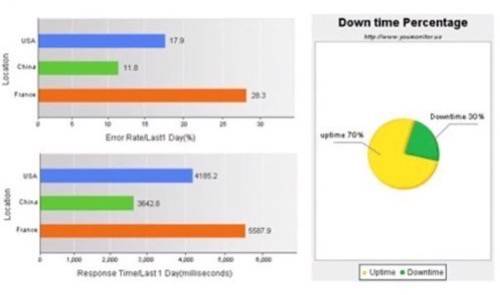YouMonitor.Us is a distributed peer-to-peer monitoring service that puts your web site to work monitoring other sites for downtime, while other sites keep an eye on yours. The service is free, provided that you volunteer some CPU cycles and bandwidth from your server to monitor other sites, and YMU provides detailed downtime reports and instant notification of outages via SMS or email.

The way it works is fairly simple. Once you’ve signed up, you’re prompted to install a script on your web server (they offer it in PHP, JSP, ASP and Perl). The script receives monitoring tasks from the YMU Control Center, and pings other web sites about 10 times per minute. Other web sites in the network will ping your site up to 5 times per minute. If anything is amiss on your site, a text message or email will be dispatched, and you’ll also get regular reports about your site’s activity over time.
The resource consumption by the script is very a low, according to YMU – approximately equal to 10 page views per minute. According to their site, running the script 100 times per minute would result in a modest CPU usage of 2-3%, memory usage of 8.5-9.5 MB, and bandwidth of 200 B/s for HTTP monitoring and 2 KB/s for HTTP transaction.

For now, the site is free to use as long as you agree to participate in the monitoring network by offering up your server to monitor other web sites. In the future, the site plans to offer a paid subscription model that would allow people to receive monitoring but not dish it out. The current planned pricing model is $9.99/month for 60 checks per hour; $29.99/month for 300 checks per hour; $4.99 for every 60 additional checks per hour, though that could change.
YMU is a pretty interesting concept. I haven’t seen any other sites doing P2P web site monitoring, but it makes sense. Because all the service’s clients are also providing the computers that are doing the monitoring, you get pinged from all over the global Internet. YouMonitor.Us currently has network computers operating on every continent (save Antarctica), and their coverage should grow as the service grows. As long as the resource consumption from running the script is negligible, as the company claims, and the script is secure — which they also claim — this could be a popular, cost effective, and useful service for webmasters.









